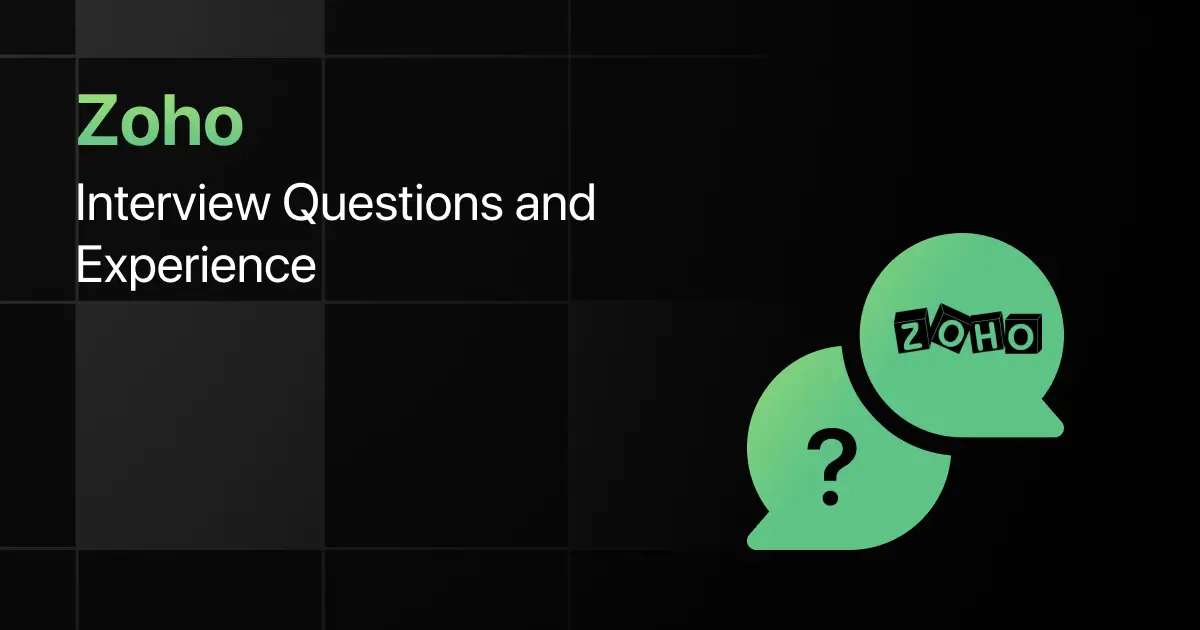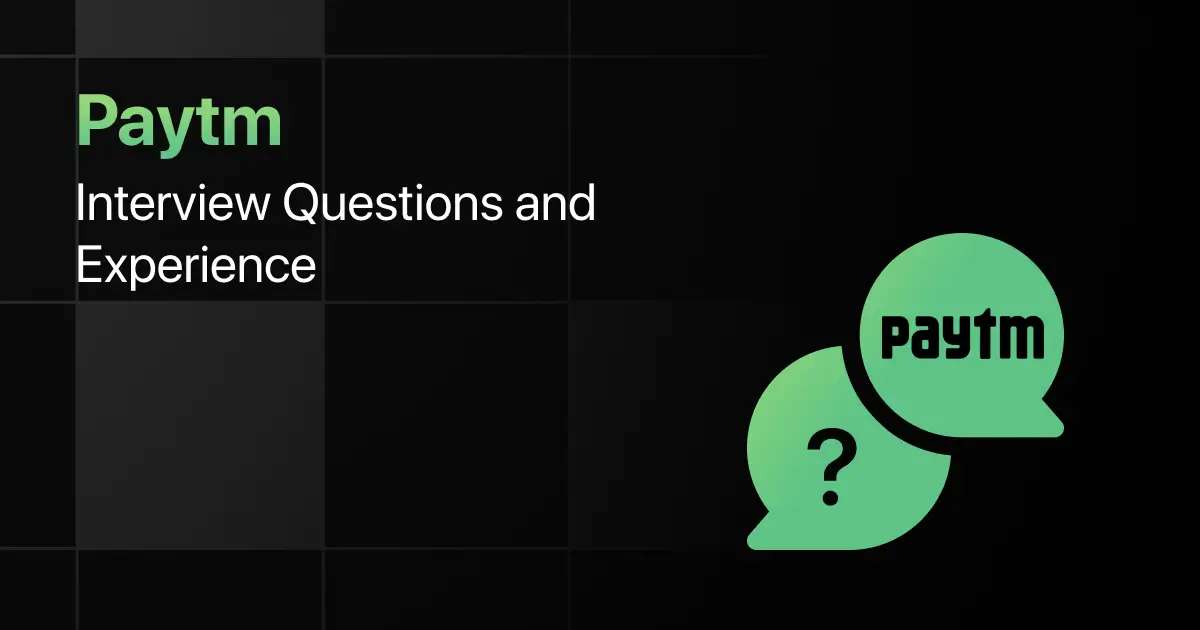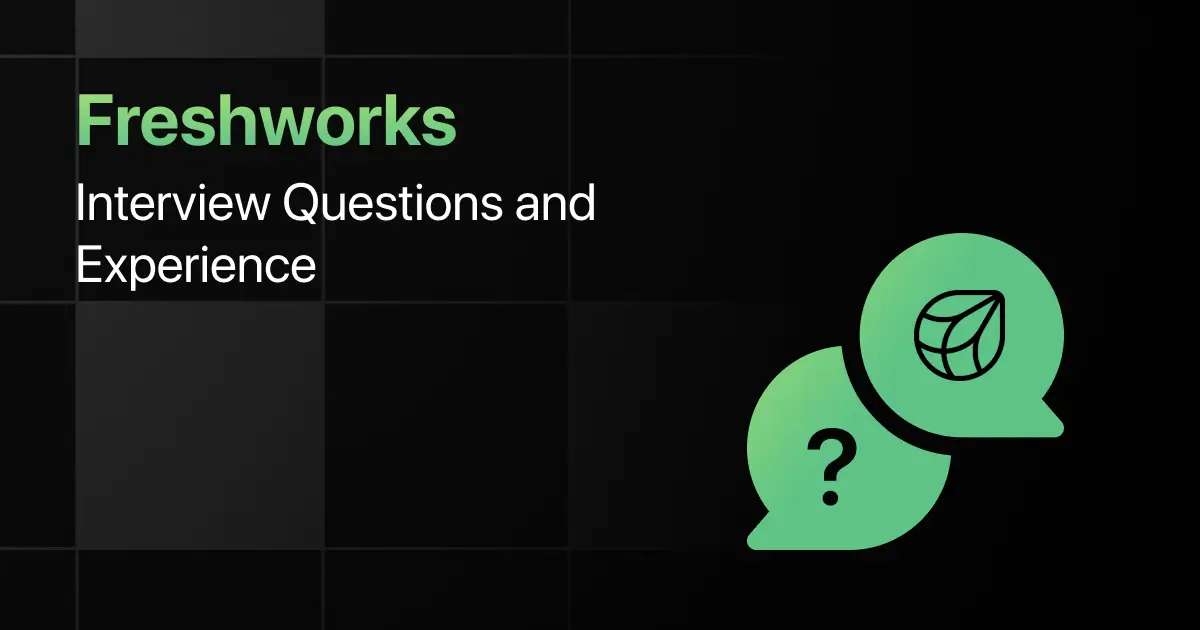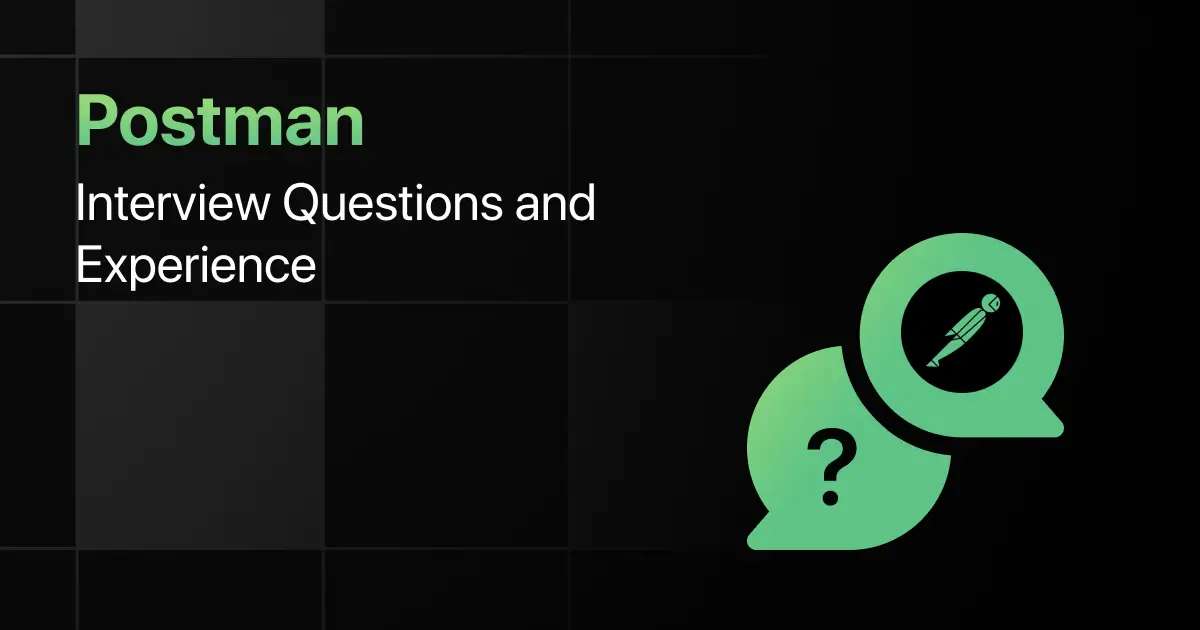Zoho Interview Questions and Experience

Have you ever wondered what it’s like to interview at Zoho, one of India’s most recognized SaaS product companies? Known for building powerful business software used globally, Zoho provides opportunities for both freshers and experienced professionals to work on impactful projects.
The Zoho interview process is unique compared to many other tech companies. It focuses not only on coding and problem-solving but also on logical reasoning, aptitude, and real-world application of technical knowledge. Candidates are assessed for their ability to think critically, work under constraints, and contribute effectively to product-driven teams.
In this blog, we’ll walk you through the Zoho hiring process, top interview questions, candidate experiences, preparation tips, and FAQs to help you prepare better.
Zoho Hiring Process – Overview
Here’s a quick overview of Zoho’s hiring process:
| Category | Details |
|---|---|
| Eligibility | Open to both freshers and experienced candidates. Preferred degrees include B.E/B.Tech, M.Tech, MCA, or equivalent in Computer Science, IT, ECE, or related fields. |
| Rounds | Typically 4–5 rounds: Aptitude Test, Coding/Problem-Solving Round, Technical Interview, Advanced Technical/System Design, and HR Interview. |
| Job Roles Offered | Software Developer, QA Engineer, Product Support Engineer, Web Developer, and System Engineer. |
| Salary Range | Freshers: ₹5 – 7 LPA (Developer roles); Experienced: ₹10 – 20 LPA depending on role and experience (based on AmbitionBox & Glassdoor). |
| Apply Link | Apply Now |
Top Zoho Interview Questions
Zoho interviews are known for testing both logical ability and technical expertise. Below are the commonly asked questions divided into technical, role-based, and behavioral sections.
1. Technical Questions
- What is the difference between C and Java?
C is a procedural programming language, while Java is an object-oriented language with built-in memory management and platform independence. - Explain the concept of pointers in C.
Pointers store the memory address of another variable, allowing efficient memory management and dynamic data structures. - What is normalization in databases, and why is it important?
Normalization organizes data to reduce redundancy and improve integrity, ensuring efficient storage and retrieval. - Differentiate between TCP and UDP.
TCP is reliable, connection-oriented, and ensures delivery. UDP is faster, connectionless, but doesn’t guarantee delivery. - What is the difference between black box testing and white box testing?
Black box testing checks functionality without looking at internal code, while white box testing verifies logic and code paths. - What is polymorphism in OOP?
Polymorphism allows a single interface to represent different underlying implementations, such as function overloading or overriding. - Explain deadlock in operating systems.
Deadlock occurs when multiple processes are waiting for resources held by each other, resulting in indefinite blocking. - What are joins in SQL, and explain different types.
Joins combine rows from two or more tables. Types include INNER JOIN, LEFT JOIN, RIGHT JOIN, and FULL OUTER JOIN. - What is a linked list, and how does it differ from an array?
A linked list stores data in nodes connected via pointers, while an array stores elements in contiguous memory locations. - Explain the difference between HTTP and HTTPS.
HTTP is unencrypted communication, while HTTPS uses SSL/TLS encryption for secure communication between client and server. - What is software testing life cycle (STLC)?
STLC is a sequence of activities in software testing, including requirement analysis, test planning, test execution, and closure. - What is the difference between primary key and foreign key in SQL?
A primary key uniquely identifies a record in a table, while a foreign key links two tables together. - What is caching, and how does it improve performance?
Caching stores frequently accessed data temporarily to reduce database load and improve response time. - Explain inheritance in OOP with an example.
Inheritance allows a class to acquire properties and methods of another class. Example: A Car class inheriting from a Vehicle class. - What are functional and non-functional requirements?
Functional requirements define specific system behavior, while non-functional requirements specify performance, reliability, and usability constraints.
2. Role-Based Questions
For Freshers (SDE-1)
- Why do you want to join Zoho as a fresher?
Zoho provides opportunities to learn across domains, work on end-to-end products, and grow in a product-driven environment. - What subjects from your academics do you think will help you here?
Core subjects like DBMS, OOPs, and operating systems will help solve real-world problems effectively. - How do you prepare for logical and aptitude-based questions?
By practicing regularly on platforms like Indiabix and solving company-specific previous year questions. - How do you handle failure when solving tough problems?
I break down the problem into smaller parts, analyze errors, and retry with improvements until I find the solution.
For QA Engineers
- What is the difference between verification and validation in software testing?
Verification checks if the product is built correctly, while validation checks if the right product is built. - What are test cases, and how do you write them?
Test cases are step-by-step instructions to test functionality, written with clear inputs, conditions, and expected outcomes. - Explain regression testing.
Regression testing verifies that recent code changes haven’t introduced new bugs into existing functionality. - What tools do you use for bug tracking?
Common tools include JIRA, Bugzilla, and Mantis. At Zoho, in-house tools may also be used.
For Product Support Engineers
- How would you handle an angry customer reporting a software bug?
I would stay calm, listen carefully, empathize, and assure them that the issue will be escalated and resolved quickly. - How do you prioritize support tickets?
By evaluating severity, business impact, and urgency, ensuring critical issues are resolved first. - How do you explain technical issues to non-technical customers?
By using simple, non-technical language, analogies, and step-by-step instructions without overwhelming them. - What is SLA in customer support?
SLA (Service Level Agreement) defines the expected response and resolution time for customer issues.
For Managers
- How do you manage a team working on multiple projects?
By setting priorities, delegating tasks effectively, and conducting regular check-ins to monitor progress. - How do you ensure your team meets deadlines?
Through realistic planning, milestone tracking, and motivating the team with clear goals. - How do you handle conflicts within your team?
By addressing issues directly, encouraging open communication, and focusing on fair, team-centered solutions. - How do you measure the success of your team?
By evaluating timely delivery, quality of output, and team collaboration.
3. Behavioral Questions
- Tell me about a time when you failed at a task. How did you recover?
I analyzed my mistakes, sought guidance, and worked harder on the weak areas to achieve better results next time. - How do you handle pressure during tight deadlines?
I break the work into smaller tasks, prioritize effectively, and stay calm while focusing on high-impact items. - Describe a situation where you worked in a team.
In my final year project, I collaborated with peers, divided responsibilities, and ensured smooth coordination for timely completion. - How do you deal with constructive criticism?
I accept feedback positively, reflect on it, and apply improvements to enhance my performance. - Tell me about a time you resolved a conflict with a colleague.
I listened to their perspective, clarified misunderstandings, and worked toward a solution that benefited the project. - How do you maintain motivation during repetitive tasks?
By focusing on the larger goal, celebrating small wins, and balancing routine tasks with new challenges. - Describe a time you showed leadership in a project.
I took initiative in organizing tasks, guiding teammates, and ensuring deadlines were met successfully. - How do you balance learning and work in a fast-paced environment?
I set aside specific time for learning new skills while ensuring work deadlines are met.
Zoho Interview Experiences
1. Member of Technical Staff role Interview Experience (Fresher)
Here is the interview experience of Vasanth Kumar, who appeared for Zoho’s off-campus drive in March 2024.
Candidate Background (Fresher, skills, education):
B.Tech student with good DSA and project knowledge. Prior coding experience through practice platforms; applied in the March 2024 off-campus drive.
Interview Process They Faced (how many rounds, what type)
- Round 1: Aptitude + “Guess the Output” coding (20 questions).
- Round 2: Short coding (5 problems, cutoff 4).
- Round 3: Long coding with DSA and application design (3 problems + project/code discussion).
- Round 4: HR round with background, family, and expectations discussion.
Questions Asked (statistical, ML, coding, case studies)
- Generate valid IP addresses.
- Reverse range in linked list (DMA).
- Check palindrome.
- Text justification.
- File handling with calculations.
- DSA: remove consecutive characters, max sum without consecutive elements, Fibonacci DP optimization.
Outcome & Difficulty Level (cleared/not, feedback):
Selected for Member of Technical Staff role. Difficulty: moderate to high — strong focus on DSA and coding clarity. Feedback: coding accuracy, project familiarity, and problem-solving depth were key.
2. SDE Role Interview Experience (Experienced)
Here is the SDE Role interview experience of Santhiya Periyasamy, who interviewed for Zoho through a multi-round selection process.
Candidate Background (Experienced, skills, education):
Engineering graduate with coding practice and problem-solving exposure; appeared for Zoho interviews in 2025.
Interview Process They Faced (how many rounds, what type)
- Round 1: Aptitude + output-based coding.
- Round 2: Morning coding (5 questions, DSA focus).
- Round 3: Additional coding challenges (4 problems).
- Round 4: Final coding (6 questions, mixed difficulty).
- Round 5: Design round — Stock Management System (5 requirements).
Questions Asked (statistical, ML, coding, case studies)
- Rotate 2D matrix anti-clockwise.
- Next greatest element from right.
- Generate valid brackets.
- Wiggle sort.
- Candy distribution problem.
- Overlapping rectangles.
- Stock management design (inventory, update, tracking).
Outcome & Difficulty Level (cleared/not, feedback):
Not selected after final design round. Difficulty: high — intensive coding focus. Feedback: strong attempt but fell short on complete implementation and design efficiency.
Preparation Tips for Zoho Interviews
Zoho interviews test logical reasoning, problem-solving, and technical depth. Here are some practical tips to help you prepare effectively.
- Practice Aptitude: Focus on quantitative aptitude, logical reasoning, and puzzles. Zoho’s written rounds often emphasize problem-solving beyond pure coding.
- Revise Core Subjects: Review DBMS, OOPs, operating systems, and networks. These topics form the backbone of technical discussions in interviews.
- Strengthen Coding Skills: Even though aptitude is key, coding questions are asked in later rounds. Practice arrays, strings, and basic algorithms.
- Understand Projects: Be ready to explain your academic or professional projects clearly, including problem statement, approach, and outcomes.
- Prepare for Testing Concepts: If applying for QA roles, revise manual testing, automation basics, and test case writing.
- Communication Skills: Zoho values clarity in explaining solutions. Practice articulating your thought process and reasoning
Final Words
Zoho’s interview process is unique and evaluates both logical ability and technical skills. With the right mix of aptitude practice, coding preparation, and communication, you can crack it confidently.
Explore More for
- Amazon
- Salesforce
- Oracle
- Microsoft
- IBM
- Adobe
- Flipkart
- Apple
- Uber
- Meesho
- Zomato
- Swiggy
- Phonepe
- Postman
- Freshworks
- Paytm
- Darwinbox
FAQs
Zoho interviews often include aptitude problems, coding questions, DBMS concepts, OOPs, operating systems, and scenario-based logical reasoning.
Zoho interview questions are moderately tough for freshers, with a strong focus on logical reasoning, aptitude, and problem-solving ability.
The Zoho interview process typically takes 1–2 weeks, depending on the role and scheduling of multiple interview rounds.
Candidates should focus on DBMS, OOPs, SQL queries, data structures, algorithms, and problem-solving with real-world applications.
Common mistakes include neglecting aptitude practice, weak explanation of projects, skipping test cases, and not communicating the thought process clearly.
Zoho usually conducts 4–5 rounds, including aptitude test, coding, technical interviews, and HR round.
Yes, freshers face aptitude and basic coding questions, while experienced candidates face in-depth technical and project-related discussions.
The best way to prepare for Zoho interviews is by practicing aptitude, coding, and core CS concepts using resources like PlacementPreparation.io.
Related Posts


Paytm Interview Questions and Experience
Preparing for a Paytm interview requires a clear understanding of the company’s hiring process, the type of questions asked, and …
Warning: Undefined variable $post_id in /var/www/wordpress/wp-content/themes/placementpreparation/template-parts/popup-zenlite.php on line 1050








